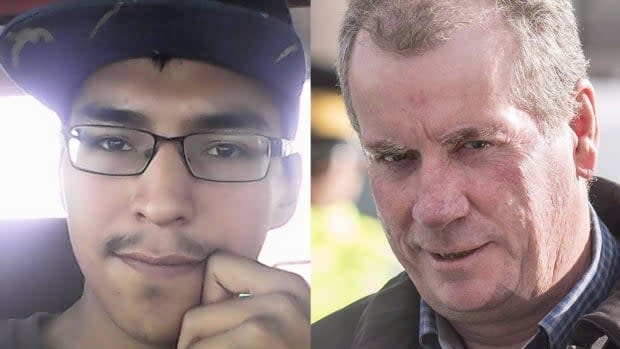Supreme Court says government's jury reforms are constitutional
Canada's highest court ruled from the bench on Wednesday that a law passed by the federal Liberal government to diversify juries is constitutional.
The Supreme Court of Canada heard a case involving Pardeep Chouhan, a Greater Toronto Area man charged with first-degree murder, who argued the changes to jury selection infringed on his rights under the Charter of Rights and Freedoms.
Bill-C-75 — An Act to Amend the Criminal Code — came into effect on Sept. 19, 2019. The legislation modified the jury selection procedure under the Criminal Code by eliminating the right of the Crown and defence to make "peremptory challenges" — to object to a proposed juror without stating a reason.
Former Liberal justice minister and attorney general Jody Wilson-Raybould introduced the changes following public outrage over the 2018 trial of Gerald Stanley, a white Saskatchewan farmer who was acquitted of second-degree murder in the shooting death of 22-year-old Indigenous man Colten Boushie.
During the jury selection process for Stanley's trial, all visibly Indigenous candidates were challenged and excluded by Stanley's defence team through peremptory challenges.

No one will ever know if the trial might have ended differently without peremptory challenges — but Boushie's family lawyer, Eleanore Sunchild, said eliminating them might have eliminated the perception of bias.
"It was really disheartening to see every Indigenous juror be challenged and know that they were being challenged simply because they were Indigenous," Sunchild said.
"I say it's a step back to allow peremptory challenges to stay. It's a step back from eliminating discrimination. There can be no justification for discrimination based on race. None."
Had the high court opted to overturn the changes to the law, Indigenous people across the country would again be weeded out of jury selection — with significant consequences for Indigenous people in the criminal justice system — said Toronto-based lawyer Caitlyn Kasper of Aboriginal Legal Services, an intervener arguing in favour of Bill C-75.
"It really bars our full participation in the justice system," she said.
"We have quantifiable real numbers to show that Indigenous people are not being chosen, that they're not being selected. And that it is regardless of what role we're playing through that process."
Peremptory challenges necessary, defence lawyer argues
But others argued the changes to the law undermined an accused person's right to a fair trial.
"Accused persons are often marginalized or racialized people, and they often have people in society who are unwilling to give them a fair shot," said Dirk Derstine, Chouhan's defence lawyer.
"I am sympathetic, of course, to the evidence [of discrimination] against Indigenous people, but this is not a situation that is of Mr. Chouhan's making. If Mr. Chouhan needs these in order to be able to get a fair trial, then we say the government should have invented a different way to end any practices which they say were very bad against Native people."

Associations representing Asian, Black and Muslim lawyers intervened in the case, insisting that the abolishment of peremptory challenges specifically affects accused people of colour because they cannot keep people with perceived biases off their juries.
Prior to the jury selection process in his trial and before Bill C-75 came into force, Chouhan brought a constitutional challenge to the Criminal Code amendments. Chouhan also argued the amendments should not apply retroactively, but the top court ruled it has retrospective application.
The Ontario Superior Court of Justice dismissed the constitutional challenge. The loss meant Chouhan's jury was formed according to the new law. He was found guilty by a jury of first degree murder in the 2016 shooting death of co-worker Maninder Sandhu.
The Ontario Court of Appeal unanimously upheld the legislation but ruled the elimination of peremptory challenges should not apply retroactively to all pending cases because it affects an accused's right to trial by jury. The Appeal Court found the amendment should not have applied to the selection process in Chouhan's case and concluded that the jury was improperly selected. Chouhan's conviction was overturned and a new trial was ordered for fall 2021.
The top court's decision restored Chouhan's murder conviction. He will now serve a life sentence.
The Crown appealed the Court of Appeal's decision and Chouhan cross-appealed on the issue of the constitutional validity of the Criminal Code amendments.
Ottawa-based criminal defence lawyer Leo Russomanno calls the jury selection process in Stanley's trial an outlier.
"It's our experience, as criminal defence lawyers, that way more often than not, peremptory challenges are used to increase the diversity of juries," said Russomanno, a board member of Defence Counsel Association of Ottawa, which intervened in the case. In a statement to CBC News, Justice Minister and Attorney General David Lametti's office said Canadians must be confident that juries reflect the communities they serve.
"Through former Bill C-75, our government made important changes to the jury selection process, including addressing longstanding and well-documented concerns that racialized Canadians were being unfairly excluded by the previous process," said the statement from Lametti's office.


